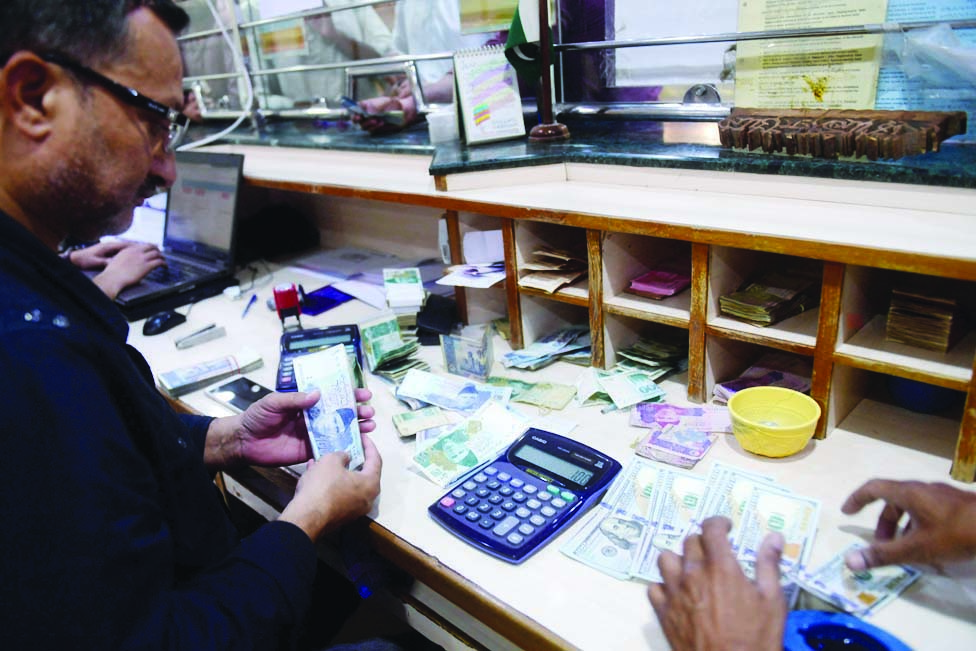KARACHI: The Pakistan rupee dropped to a historic low of 191 rupees to the dollar Thursday as an ongoing political crisis rocked confidence in the currency. The rupee has been declining for months, but the fall became precipitous in March when opposition parties tabled a no-confidence motion against Prime Minister Imran Khan that led to the dissolution of the national assembly last week.
The rupee has lost over six percent in a month, and on the open market Thursday was at 191 -- and 189 at the interbank rate. "The political mess has ensued from uncertainty and this badly reflects on the rupee," said Mohammad Sohail, chief of Topline Securities, a Karachi based brokerage and economic research house. Pakistan's supreme court was sitting Thursday to rule on the legality of political manoeuvres that led Khan to dissolve the national assembly. Pakistan's foreign exchange reserves, which rely on remittances from the diaspora, have failed to stop a growing trade deficit.
Reserves have fallen to $12 billion from $16 billion since March as the deficit hit 70 percent for the nine months of the fiscal year spanning 2021-22. Since July 2021, the rupee has lost 18 percent of its value against the dollar. Relations with the United States and International Monetary Fund (IMF) are also critical factors. The IMF has approved a $6 billion bailout package for Pakistan to support its balance of payment issue in 2019. Half was disbursed, but the rest is being renegotiated.
 KARACHI: People exchange foreign currency at a shop in Karachi on April 7, 2022. - AFP
KARACHI: People exchange foreign currency at a shop in Karachi on April 7, 2022. - AFP
Political crisis continues
Pakistan President Arif Alvi told the country's election commission Wednesday to fix a date for a new national ballot, as the supreme court adjourned a hearing into the legality of political manoeuvres that led to parliament being dissolved. The court - which will sit for a fourth day Thursday - must rule if the deputy speaker of the national assembly violated the constitution by refusing to allow a no-confidence vote against Prime Minister Imran Khan at the weekend.
Had the vote taken place Khan was certain to have been booted from office, but the move allowed him to get the loyalist president to dissolve parliament and order an election. The opposition have cried foul and are refusing to cooperate with forming an interim government to oversee any ballot, but on Wednesday Alvi upped the ante. A statement from his office said the election commission had been told to propose a date "in order to carry out the mandate of the Constitution".
On the campaign trail
While the opposition applied its resources to the court, Khan effectively hit the campaign trail - telling party workers in Lahore late Tuesday that he would be more careful in picking candidates to stand for his Tehreek-e-Insaf (PTI) party. Khan's woes started weeks ago when a group of rebel PTI lawmakers threatened to vote against him, but his fragile ruling coalition was beginning to unravel anyway. There had been high hopes for Khan when he was elected in 2018 on a promise of sweeping away decades of entrenched corruption and cronyism, but he struggled to maintain support with soaring inflation, a feeble rupee and crippling debt.
Nuclear-armed Pakistan has been wracked by political crises for much of its 75-year existence, and no prime minister has ever seen out a full term. Whether the election commission has the capacity to organise a ballot within 90 days remains to be seen, with a watchdog group warning this week of "grave concerns" for potential violence. "The Free and Fair Election Network (FAFEN) has identified multiple constitutional, legal and operational challenges to the conduct of an early election," said the group.
"Public confusion and political divisions that have already arisen as a result can potentially translate into violent expression." Khan has already blown anti-US sentiment into the political atmosphere by saying the opposition had colluded with Washington for "regime change". The cricketer-turned-politician says Western powers want him removed because he will not stand with them against Russia and China, and the issue is sure to ignite any forthcoming election.
Court precedent
It is unclear when or how the court will rule on the issue - or if Khan would even accept its decision -- but there is precedent. In 1988, Muhammad Khan Junejo appealed to the court after the assembly was dissolved by then president General Zia-ul-Haq, who had taken power in a military coup years earlier.
It agreed his government had been dissolved unconstitutionally, but ruled that since elections had been announced anyway it was best to move on. In 1993, the court ruled president Ghulam Ishaq Khan had also illegally dissolved the assembly -- then with Nawaz Sharif as prime minister. The Supreme Court is ostensibly independent, but rights activists say previous benches have been used by civilian and military administrations to do their bidding throughout Pakistan's history.
Publicly the military appears to be keeping out of the current fray, but there have been four coups since independence in 1947 and the country has spent more than three decades under army rule. "I don't think the court is going to deliver any noticeable decision, it will be a sort of doctrine of necessities," said Ayesha Siddiqa, an independent analyst. "On one side judges will declare the ruling of the deputy speaker as unconstitutional, but at the same time will justify the fresh elections... as every political party wants to go for a fresh election."- AFP




